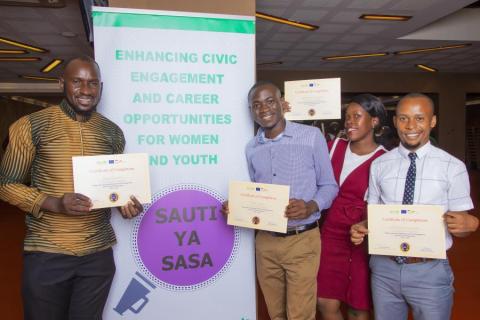
The mentees who have been attending the SAUTI YA SASA young women and youth mentoring programme implemented by Action for Development (ACFODE) have secured important networks for their initiatives. Some of them have in fact submitted proposals and secured partnership for new projects. This is arising from the knowledge and skills in civic engagement and professional development that the mentees have acquired while on the mentoring programme.
The specific skills that have facilitated the partnerships include planning, gender mainstreaming, fundraising, networking, and communication among others. Ms Daisy Naluwuge of Kisoboka Africa Initiative – a Community Based Organization (CBO) operating in Lwengo district (greater Masaka) – has secured funding from MNS Foundation from the United States for a project on financial literacy training and income generating activities for rural women and youth. Kisoboka Initiative has also integrated gender in the operations of the organization and scaled up actions in rural communities. In the words of Ms Daisy Naluwuge; “we now do things differently because of the mentoring. We have improved our engagements with the communities, and we have also integrated gender into our initiatives”.
Daisy adds; “I was guided by my mentor Ms Susan Bakesha on how to fundraise for projects. Later, my initiative (Kisoboka Africa Initiative) hosted guests from MNS Foundation in USA and submitted a proposal. The response is so far positive and we are now waiting for funding in 2020 for a project on scaling up financial literacy training and income generating activities for rural women and youth”. Daisy Naluwuge is not the only success. Emmanuel Oruk, one of the 7 male youths who completed the programme, has delivered improved trainings on the use of the internet to users across different parts of the Uganda. According to him, he can now prepare and deliver 100% content that is loved and appreciated better by users. Currently, Oruk is implementing the Google Digital Skills Programme for Africa, which according to him, is running very smoothly due to the new skills and knowledge acquired through networking with organizations across the world.
In his own words; “my mentor invited me to attend workshops and conferences, the most outstanding being the Africa Internet Summit, which was in line with what we both were engaging. Through that workshop, I interacted with internet organizations and fraternities across the world and I learnt a lot of things which I am now applying”, he said. The other key success is Winnie Ejou who also confidently reported that she learnt and mastered grant and proposal writing as well as networking and working with other people, and that this has enabled her to enhance performance. Prior to the success, the mentees grappled with limitations in several skill sets including networking and fundraising / proposal writing. Many of them in fact cited the desire to improve these limitations as the motivation for joining the mentoring programme. Indeed prior to the programme, many mentees rated themselves average or even poor. In addition, their mentors also rated them average and on some rare occasions just good. Very few considered themselves very good or excellent. Oruk confirmed this when he said; “I was just average when I joined the programme”, To equip the mentees with the knowledge and skills that enabled them to score the above successes, ACFODE carried out a number of activities. After selecting the mentees and mentors, ACFODE developed programme materials which included a mentoring guide which detailed out the actions that guided the mentors and mentees in understanding and executing the program.
ACFODE also conducted orientation and pairing of the mentees and mentors, and facilitated them to develop and implement action plans containing key activities, milestones and schedules for implementation. There were monthly sessions for mentees on topical issues including gender and civic engagement, entrepreneurship, plus personal and professional development. The sessions enabled the mentees to share experiences and these were facilitated by experts in gender and career development. While commenting on the monthly sessions, Daisy revealed that she became a better person and a team player; “I learnt a lot from the joint monthly sessions that were facilitated at ACFODE. I became a better team player, and my interpersonal skills improved. I now understand better the views of other people and also the beauty of agreeing to disagree”, she said.
